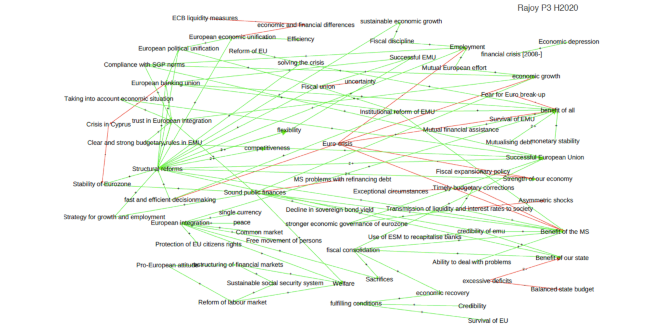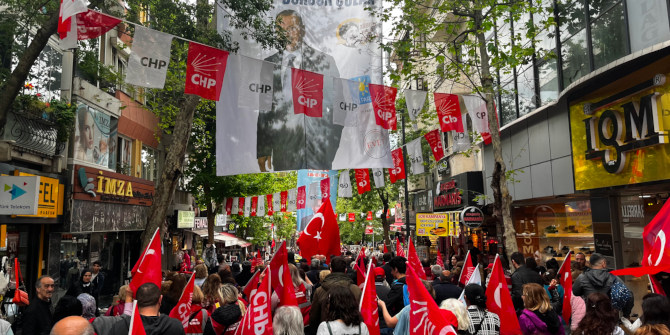Opinion polls suggest neither of the two main political blocs are likely to secure a majority at Poland’s parliamentary election this autumn and that a radical right party may hold the balance of power. As Aleks Szczerbiak explains, this will create pre-election and post-election strategic dilemmas for the main parties.
The radical right-wing Confederation (Konfederacja) party is a political conglomerate mainly comprising free-market economic libertarians, originally clustered around the veteran political eccentric Janusz Korwin-Mikke, and radical nationalists from the National Movement (RN) grouping.
Focusing primarily on tax cuts and reducing the size of the welfare state, in the most recent autumn 2019 parliamentary election the party secured 6.8% of the vote and won 11 seats in the 460-member Sejm, Poland’s more powerful lower legislative chamber. Despite the apparent tensions between its component parts, the grouping held together. In the June-July 2020 presidential election, its candidate, the articulate and relatively young nationalist politician Krzysztof Bosak, finished fourth, again with 6.8%.
The Confederation’s success suggested that there was a social base for its brand of politics, comprising a segment of right-leaning voters who felt that the large state support and social welfare programmes that were the key to the electoral success of the right-wing Law and Justice (PiS) grouping, Poland’s ruling party since autumn 2015, did not address their concerns.
The Confederation enjoys particularly high levels of support among younger men living in smaller towns and rural areas. For example, a March 2023 survey conducted by the Ipsos agency for the OKO.press portal found that 27% of under-40s supported the Confederation (11% across all voters), rising to 37% among younger men (11% younger women). These voters often felt that they had limited chances for professional and career advancement, were frustrated with the apparent ‘glass ceiling’ of vested interests and corrupt networks that stifled opportunities for them, and did not see state support as the solution to their problems.
Last summer, the Confederation saw a dip in support. While opposing the Russian invasion of Ukraine, it was the only major Polish political grouping to criticise the Law and Justice government for engaging too actively in the war. Arguing that Poland’s interests were not always identical to Ukraine’s, the party was sceptical about the very generous aid provided by Warsaw to the Ukrainian government. It also opposed granting the huge numbers of refugees who came across the border to Poland what it argued were special privileges at the expense of Polish society. But this backfired amid overwhelming public support for Ukraine and the refugees.
The Confederation bounces back
However, recent polls have shown an increase in support for the Confederation. According to the ‘Pooling the Poles’ micro-blog that aggregates voting intention surveys, the party is averaging 10% which translates into 41 seats. The same polls suggest that neither the current ruling party nor the liberal, centrist and left-wing opposition groupings will secure an outright majority after this autumn’s election, leaving the Confederation in the position of kingmaker in the new parliament.
Why has this happened? Firstly, the Confederation has benefited from a strong pivot to the left by the liberal-centrist Civic Platform (PO), Poland’s governing party between 2007-15 and currently the main opposition grouping. Civic Platform was formed originally as a pro-free market party but has now almost completely abandoned its earlier roots and, in an effort to outbid Law and Justice on social spending, alarmed liberals by adopting the language of, and many of the economic policies associated with, the left.
These include recent pledges to offer interest-free mortgages for under-45s buying their first home and state benefits of 1,500 złoties per month for mothers returning to work after maternity leave. This has created an opening on Civic Platform’s traditional liberal flank which the Confederation is trying to exploit by opposing large-scale fiscal transfers and calling for lower, simpler taxes and less state regulation.
At the same time, as a result of the recent crisis over grain imports, the Confederation feels that its risky Ukrainian war narrative appears to have been at least partially vindicated. The issue arose following the Russian blockade of Black Sea ports as a result of which the EU scrapped customs duties and quotas and allowed re-routed Ukrainian grain to pass through Poland and other East European countries on to African and Middle Eastern markets.
However, much of this cheap grain ended up staying in Poland which, together with last year’s bumper harvest, caused farmers to make huge losses. As a consequence, the Law and Justice government temporarily prohibited imports of several agricultural products from Ukraine. All of this made rural voters – who will be crucial in autumn’s election, but as a demographic are wary of some of the Confederation’s free-market policies – more receptive to the party’s message that, in focusing on providing solidarity with Ukraine, Law and Justice failed to properly protect Polish farmers’ interests.
Out of step with its supporters?
The Confederation has also professionalised its image by consciously sidelining its most radical leaders, such as Korwin-Mikke and the highly controversial political maverick Grzegorz Braun, both of whom are associated with pro-Russian rhetoric and other extreme positions.
Last October, Korwin-Mikke was replaced as leader of his eponymous ‘KORWiN’ party by the charismatic 35-year-old businessman Sławomir Mentzen, who also rebranded and renamed the grouping ‘New Hope’ (Nowa Nadzieja). Together with Bosak, Mentzen now dominates the Confederation’s media profile, communicating the party’s radical programme in a more measured and reasonable way.
Mentzen is also the most effective utiliser of the internet among Polish politicians. Ignored by the traditional broadcast and print media, the Confederation was forced to find its own political communication channels. Like a number of the party’s leaders, Mentzen has, therefore, developed a strong online presence and built his profile through social media, which is also its younger core electorate’s main source of political information, where he presents himself as a self-assured and authoritative financial expert and entrepreneur. Mentzen was, for example, one of Poland’s first party leaders to be active on TikTok where he has 700,000 followers and his short videos receive millions of likes.
The Confederation’s opponents have tried to discredit the party among potential new supporters by arguing that its leadership’s strongly socially conservative views on moral-cultural issues such as abortion diverge from those of its social base of younger Poles. They note that, for example, in 2019 Mentzen allegedly summed up the Confederation’s five-point policy programme as: ‘we don’t want Jews, homosexuals, abortion, taxes and the EU’ (known as the ‘Mentzen Five’). They also cite a website published by Mentzen shortly before the last parliamentary election containing 100 draft laws that he wanted passed including: the creation (for those who wanted them) of ‘un-dissolvable’ marriages that could only be terminated with the consent of a bishop, the return of the death penalty, and ten-year prison sentences for any woman who had an abortion.
However, Confederation politicians argue that the ‘Mentzen Five’ was an extract from a lengthier political marketing lecture cited out of context that simply presented a theoretical example of what polling suggested the party’s voters wanted and not his own views. The ‘100 laws’ were, they say, a ‘pre-historic’ project most of which Mentzen did not author or even remember. Moreover, although they have quite socially liberal views, Confederation voters also often see the ‘cancel culture’ that they associate with the ‘woke’ left as a greater threat to their personal freedom than the religious right.
Post-election dilemmas
What will happen if the Confederation ends up holding the balance of power in the next parliament? The party says that it does not want to enter a coalition with either Law and Justice or the other current opposition parties, which it attacks with equal vigour. Obviously, it cannot signal ahead of the election which of the two blocs it would be prepared to govern with because this would undermine the party’s appeal with its core anti-establishment electorate. For the same reason, even after the election it will be difficult for the party to maintain its radical insurgent ‘anti-system’ image if it ends up making the kind of compromises and deals that are required to participate in a governing coalition.
On the other hand, the Confederation’s leaders would prefer to have real influence on government policy, rather than simply being a repository of protest votes and perpetually in opposition. Most commentators expect the party to come to some kind of accommodation with Law and Justice and suggest that its leaders are pragmatic and biddable so would be tempted to join a government if they could secure influence over ministries that are key to their programmatic priorities.
However, it is difficult to envisage a party for whom reducing state intervention is a core element of its appeal being given a significant say on economic matters in a government led by Law and Justice, which owes much of its recent political success to large social welfare programmes. Moreover, although the Confederation’s nationalist wing is nominally ideologically closer to the current ruling party, many of its leaders remember how their previous grouping, the now-defunct League of Polish Families (LPR), was marginalised and then eliminated when it was Law and Justice’s junior coalition partner in the 2005-7 parliament.
Indeed, the Confederation’s own long-term strategic goal is to replace Law and Justice as the dominant party on the Polish right. It is counting on a major shake-up after Law and Justice’s 73-year-old leader Jarosław Kaczyński stands down, most likely during the next parliament. Although he does not hold any formal government positions, Kaczyński has provided a crucial source of cohesion within the governing camp, but the Confederation believes that his previously unquestioned authority and influence are steadily weakening. In that sense, it might be more advantageous for the party to wait out another term in opposition, particularly given its leaders are still relatively young.
A more attractive scenario for the party may, therefore, be for it to prop up a minority government through an informal governing pact rather than a formal coalition. But Law and Justice may also try and persuade Confederation deputies (and those from other parties) to defect so that it can obtain the votes it needs to secure a parliamentary majority without such a deal. The larger the Confederation’s parliamentary caucus, the more likely it is that its deputies will have weak ideological underpinnings and peel away, especially if Law and Justice falls just a few seats short of a majority.
In fact, the Confederation’s voter base is quite ideologically diverse, exemplified by the fact that Bosak’s voters in the 2020 presidential election divided evenly between the Law and Justice and Civic Platform candidates in the second-round run-off. Indeed, in some ways it may be easier for the current opposition parties to accommodate the Confederation’s economic policy demands; although the party’s radical Eurosceptic stance on issues such as EU climate policy would be much more problematic, and such a governing arrangement would face bitter hostility from groupings such as the radical ‘Left Together’ (Lewica Razem) party.
Lasting trend or temporary blip?
The Confederation clearly has a realistic chance of becoming a member of, or propping up, the next Polish government. However, if the election campaign develops a polarising dynamic, some of its new voters could return to the two big camps, while uncertainty as to whether voting for the party will lead to a change of government may also prevent potential voters from supporting it. Or the party may just be peaking too early and find it difficult to maintain its momentum in the election runup, especially if its more controversial leaders slip through the media filter. The Confederation’s recent poll success may, therefore, simply turn out to be a temporary blip rather than a lasting trend.
Note: his article first appeared at Aleks Szczerbiak’s personal blog. The article gives the views of the author, not the position of EUROPP – European Politics and Policy or the London School of Economics. Featured image credit: Valentyn Chernetskyi on Unsplash





